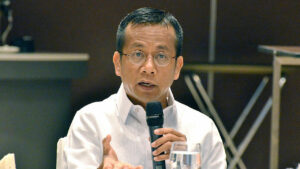THE National Economic and Development Authority (NEDA) said the government’s strategy for the economy is ultimately geared towards raising domestic production, adding that it is temporarily resorting to imports to stabilize prices.
NEDA Secretary Arsenio M. Balisacan, speaking before a Senate panel, was addressing remarks by Senators on the need to reduce reliance on imports.
“Our trade policy is used to enhance the workings of the economy in such a way that we can stabilize prices, create employment, and make our local products more competitive,” he said before the chamber’s finance committee as he delivered a Development Budget Coordination Committee (DBCC) briefing on the proposed 2024 budget.
“Looking longer-term and for the rest of this medium-term plan, our priority is to improve productivity,” he added.
Senators Ana Theresia N. Hontiveros-Baraquel, Maria Lourdes Nancy S. Binay, and Juan Edgardo M. Angara, who chairs the committee, had asked Mr. Balisacan to explain the government’s efforts to encourage domestic production.
Mr. Balisacan said the government supports enhanced research and is coordinating agency efforts to raise productivity.
“We need to supply our domestic producers with the equipment and farming materials they need,” Ms. Hontiveros-Baraquel said during the DBCC session before the committee.
“We just have to do it and take out the other blocks and exacerbating factors along the way including smuggling.”
She said the proposed P5.768-trillion national budget for 2024 should also incorporate “safety nets” for producers and those vulnerable to the effects of inflation.
Mr. Balisacan said the government must not see imports as a permanent solution, citing the need to invest in logistics and provide technological support to farmers.
“This is a time of crisis, and the 2024 national budget should reflect that fact in the form of greater assistance to our people,” Ms. Hontiveros-Baraquel said.
Finance Secretary Benjamin E. Diokno, also at the briefing, disputed Ms. Hontiveros-Baraquel’s characterization that the economy is in crisis.
“The International Monetary Fund and the World Bank admire the way we have handled the Philippine economy,” he said.
“The credit rating agencies, despite the massive downgrades of economies all over the world, have maintained the Philippines’ credit rating.”
Last week, Japan-based Rating and Investment Information, Inc. (R&I) upgraded its investment rating outlook on the Philippines to “positive” from “stable.”
According to R&I, the Philippine economy has been performing well in the face of global uncertainty. Gross domestic product grew 7.6% in 2022, and 6.4% in the first quarter of 2023.
The Philippines currently falls short of an “A”-level rating, with Moody’s Investors Service rating the country at “Baa2,” S&P Global Ratings “BBB+,” and Fitch Ratings at “BBB.”
Mr. Angara said the government should take advantage of its resources to empower its industries, especially agriculture.
In July, Senate President Juan Miguel F. Zubiri said Congress will focus on passing a measure that will devise a multi-year strategy enhancing the global competitiveness of Philippine companies.
The Tatak Pinoy Bill, written by Mr. Angara, is expected to help the Philippines achieve its goal of becoming a middle-class economy by 2040.
“Let’s use the government and its vast resources over markets to help industries be more competitive,” he told the same briefing.
Senator Cynthia A. Villar, who heads the Senate agriculture committee, called for the modernization of agriculture via collaboration with the farm machinery manufacturers.
“That’s the idea of mechanization; we have to modernize,” she said, calling the days of manual farming over. — John Victor D. Ordoñez

